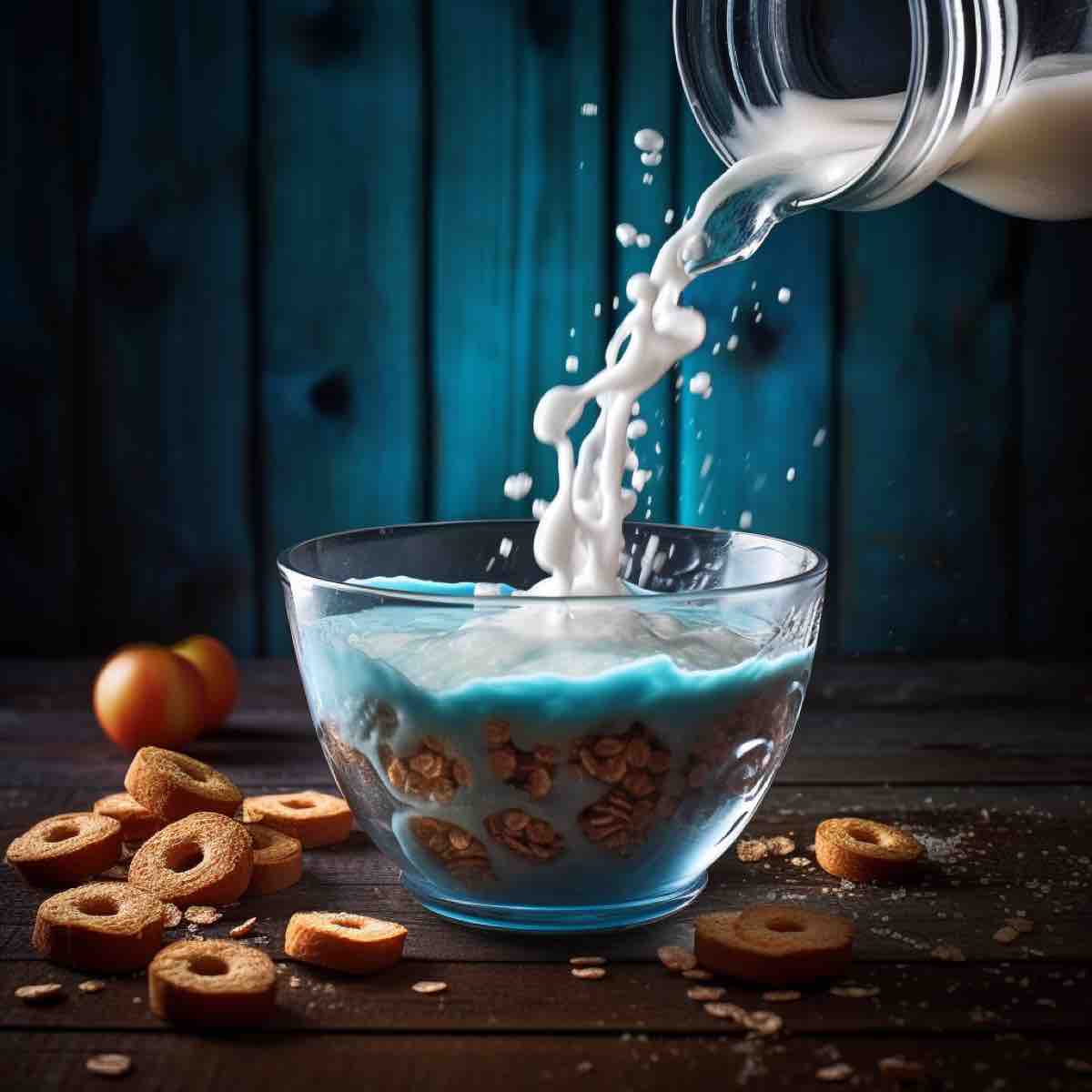is water a good substitute for milk in cereal

Is Water a Suitable Milk Substitute for Cereal?
Water is a common beverage used to quench thirst and hydrate the body. However, some people have started using water as a substitute for milk in cereal. This has led to a debate about the nutritional value of water as a cereal accompaniment. While some people argue that water is a healthier alternative to milk, others believe that milk is essential for a balanced diet.
A nutritional comparison between water and milk is necessary to determine the better cereal option. Milk is an excellent source of calcium, vitamin D, and protein, which are essential nutrients for the body.
On the other hand, water has no nutritional value and does not provide any essential nutrients to the body. Therefore, it is important to consider milk’s nutritional benefits before substituting it with water.
If you are concerned, use almond or oat milk.
Key Takeaways
- Milk is a good source of calcium, vitamin D, and protein essential for the body.
- Water has no nutritional value and does not provide any essential nutrients to the body.
- It is important to consider milk’s nutritional benefits before substituting it with water.
Is Water a Good Substitute for Milk in Cereal?
Regarding breakfast, cereal with milk is a classic and conventional option. However, for those who are lactose intolerant, vegan, or prefer a non-dairy option, milk substitutes have become increasingly popular. But what about using water instead of milk? Is it a good substitute? Let’s explore the nutritional comparison, texture and taste, and milk substitutes to find out.
Nutritional Comparison
When comparing water and milk, it’s clear that milk has more nutritional value. Dairy milk is a good source of protein, calcium, and vitamins A, D, and E. It also contains fat, which can help keep you fuller for longer. On the other hand, water has no nutritional value, except for hydration.
Texture and Taste
One of the main reasons people enjoy cereal with milk is for the texture and taste. Milk adds a creamy and slightly sweet flavor to the cereal, while also softening the texture. Conversely, water has a neutral flavor and does not add any creaminess or sweetness. Some people may find that cereal with water has a more bland taste and a harder texture.
Milk Substitutes
For those who cannot or choose not to consume dairy milk, several milk substitutes are available. Almond, coconut, soy, and oat milk are popular options. These milk substitutes vary in taste, texture, and nutritional value. For example, almond milk has a nutty taste and is low in calories, while soy milk has a high protein content and is a good source of vitamins and minerals.
While water may not be the best substitute for milk in cereal, many milk substitutes can provide similar nutritional value and taste. It ultimately comes down to personal preference and any allergies or dietary restrictions.
Overall, water may not be the best option for those who enjoy the taste and texture of cereal with milk. However, for those who are looking for a neutral and low-calorie option, water can be a suitable substitute.
Nutritional Comparison
When it comes to the nutritional value of water and milk in cereal, there are some significant differences to consider. Milk provides a range of nutrients, including protein, fat, calcium, and vitamins A and D. Water, on the other hand, does not contain any of these nutrients.
One of the main benefits of using milk in cereal is the protein content. Depending on the type of milk, a serving can provide around 8-10 grams of protein, which is important for building and repairing muscles. In contrast, water does not contain any protein, which means that using it as a substitute for milk in cereal may not provide the same benefits.

Milk also contains fat, which can help to keep you feeling fuller for longer. This can be especially important for people who are trying to manage their weight or maintain a healthy diet. While some milk alternatives, such as almond and coconut milk, contain healthy fats, water does not provide any of these benefits.
When it comes to vitamins and minerals, milk is a good source of calcium, which is important for building and maintaining strong bones. It also contains vitamins A and D, which are essential for maintaining healthy skin, eyes, and immune function. While some milk alternatives, such as soy milk and oat milk, are fortified with these nutrients, water does not provide any of them.
Overall, while water may be a suitable substitute for milk in cereal for some people, it is important to consider the nutritional differences. Milk provides a range of nutrients that are important for overall health, and using water as a substitute may not provide the same benefits. However, for those who are lactose intolerant or have a milk allergy, milk alternatives such as almond milk or soy milk may be a good option.
Texture and Taste
When it comes to cereal, texture and taste are essential factors that can make or break the experience. While milk is the conventional option for many, some people may wonder if water can be a suitable substitute.
Water has a neutral flavor and lacks the creaminess and sweetness that milk provides. As a result, it may not complement the flavor of sugary cereals like Cocoa Puffs or Froot Loops. However, water can be a viable option for those who prefer a less sugary variety.
In terms of texture, water can make cereal soggy faster than milk. This may not be an issue for those who prefer their cereal softer, but it can be a drawback for those who enjoy a crunchier texture.
For those who cannot consume dairy milk due to allergies or personal preference, several milk alternatives are available, such as almond milk, coconut milk, soy milk, and oat milk. These alternatives offer a variety of flavors and textures that can complement different types of cereal. For example, unsweetened almond milk has a nutty taste that can pair well with bran cereal or granola.
Powdered milk can also be used as a substitute for milk. It can provide a similar texture and taste to dairy milk when mixed with water. However, plant-based milk alternatives may lack some of the health benefits.
Whether water can be a suitable substitute for milk in cereal depends on personal preference. While it may not provide the same flavor and texture as milk, it can be a viable option for those who cannot consume dairy or prefer a less sugary variety.
Milk Substitutes
Regarding cereal, milk is the traditional go-to for most people. However, many milk substitutes can be used instead. Here are a few popular options:
Almond Milk
Almond milk is a popular milk substitute that is made from ground almonds and water. It has a slightly nutty flavor and is lower in calories than regular milk. It is also a good source of vitamin E and can be a good option for lactose intolerant people.
Coconut Milk
Coconut milk is made from the meat of coconuts and is a popular milk substitute in many parts of the world. It has a sweet, nutty flavor and is high in fat. It is also a good source of iron and can be a good option for those who are looking for a dairy-free option.
Soy Milk
Soy milk is made from soybeans and is a popular milk substitute for those who are lactose intolerant or vegan. It has a mild, nutty flavor and is a good source of protein, calcium, and vitamin D. It is also low in fat and calories.
Oat Milk
Oat milk is made from oats and water and has a slightly sweet, nutty flavor. It is a good option for those who are lactose intolerant or vegan and is also a good source of fiber. It is low in fat and calories and can be a good option for those who are looking for a dairy-free option.
Rice Milk
Rice milk is made from rice and water and has a slightly sweet flavor. It is a good option for those who are lactose intolerant or vegan and is also low in fat and calories. However, it is not a good source of protein or calcium.
When it comes to milk substitutes for cereal, there are many options available. Each has its unique flavor and nutritional profile, so choosing the one that best fits your needs is important.
Frequently Asked Questions
Can you substitute water for milk in cereal?
Yes, you can substitute water for milk in cereal. However, it will significantly alter the taste and texture of the cereal.
What are some alternatives to milk for cereal?
Some alternatives to milk for cereal include plant-based milk such as almond, soy, or oat milk, yogurt, fruit juice, or even just eating cereal dry.
Is it healthy to eat cereal with water?
Cereal with water can still provide some nutritional value, but it may not be as healthy as cereal with milk or other alternatives. Milk provides calcium, vitamin D, and other nutrients that water does not have.
Why do some people prefer cereal with water instead of milk?
Some people prefer cereal with water because they may be lactose intolerant, vegan, or simply prefer the taste.
What does cereal with water taste like?
Cereal with water has a bland taste and lacks the creaminess and sweetness that milk provides. The texture may also be different, as the cereal may become mushy or soggy faster.
Is cereal better without milk?
Cereal without milk can still be a healthy and tasty breakfast option. However, milk provides additional nutrients and can enhance the flavor and texture of the cereal.
